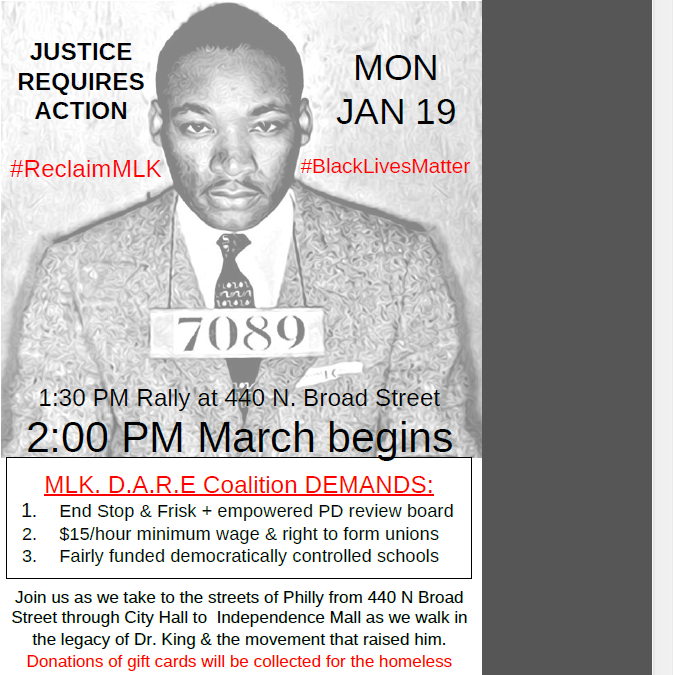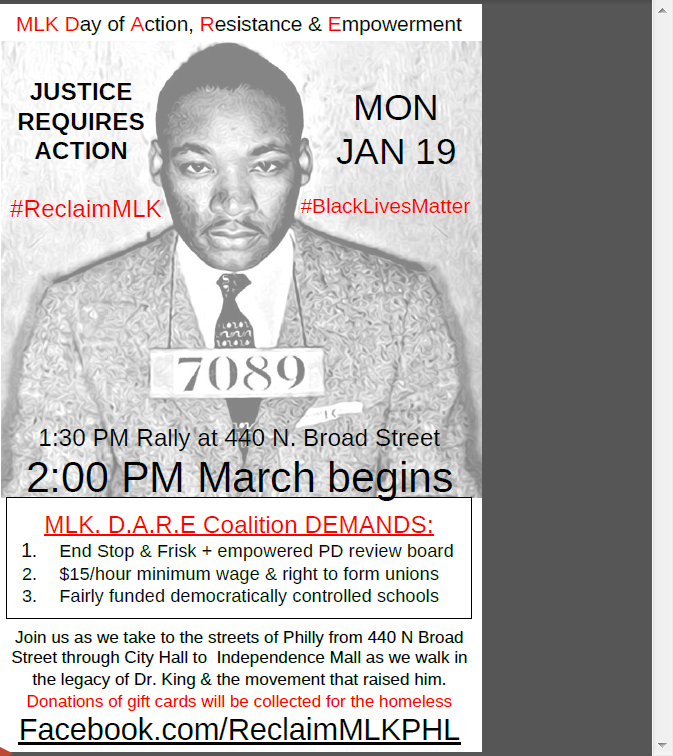On Monday, January 19 POWER, the interfaith social justice organization of which I am a part, along with several other social justice and labor organizations have organized a march called MLK Day of Action, Resistance and Empowerment. The march will focus on racial justice in three areas: education, employment and criminal justice. We will be demanding a fair and full funding formula for public education and local control of our school board (which has been under partial state control since 2001); we will be demanding a raise in the minimum wage to $15/hour and the right to form unions; and we will be calling for an independent citizens review board to work with the police and an end to “stop and frisk” tactics used by police. We are expecting at least 10,000 people from across the metropolitan area to participate. I intend to be one of them, and those of you who live near or in the city, I urge you to be there too.
This march is an extension of the many actions that have occurred over the past couple months since the decisions to not indict in the highly publicized Ferguson and Staten Island cases. However, this march also marks the coming together of several organizations that have been working for a much longer time on their own campaigns and that recognize we share the same struggle for equity and fairness for all, just in different arenas. Further it recognizes that there is an ongoing process of dehumanization against poor people and people of color occurring in this country, and that the deaths of Michael Brown and Eric Garner were not isolated events, but symptomatic of a deep and pernicious ongoing process of injustice. Furthermore the march recognizes the deep divides between the privileged and the oppressed, the haves and the have-nots. As the “Call to Conscience” statement written for the march states:
“Philadelphia is more divided along race, class and gender lines than at any time in recent memory. We are two cities, one of privilege and wealth, the other of poverty, police brutality, low and poverty wages, collapsed schools and collapsing neighborhoods.”
The march also recognizes that the memory of Dr. King itself has itself been sanitized, in that we remember him only as a great servant of oppressed people. However, as the recent movie “Selma” so clearly depicts, Dr. King was also a modern day prophet whose words not only challenged the powers of his time, but speak to the powers of our era as well. As the “Call to Conscience” also says:
“It is time to break the silence about what Dr. King called the triple evils: racism, poverty and militarism. These forms of violence, indeed terror, exist in a vicious cycle, deteriorating hope, progress and opportunity, as a result of humankind’s depravity toward its own.”
I am among those who are privileged racially, educationally and economically for whom this society “works” in terms of more than providing for my basic needs. However, over 40 years ago I first gained a glimpse of racial injustice as I walked the segregated streets of Durham, NC where I was attending college. Since that time I have sought to apply my mind, my heart and most importantly my body in working for the beloved community about which Dr. King spoke so eloquently. Though I am continually reminded I can choose NOT to care and be involved, over those 40+ years it no longer feels or seems like a choice I could ever make. I have developed friendships and heard stories of people who have suffered under the racial inequities that our society’s institutions propagate. These stories and relationships have worked their way into my soul such that I see their liberation as part of my own.
However altruistic and noble this may sound, there is a more selfish reason I am going. At a recent anti-racism training sponsored by POWER, I learned about a Zulu greeting that in English means “I see you.” And the response that is given is “Then I am here.” In the context of the workshop, this greeting was used to illustrate that some people in our society are not seen, that their needs and desires are invisible when it comes public policies regarding education, health care, employment, criminal justice, housing and the like. However, as I have reflected on that phrase, I have taken it also to mean something very personal for myself.
Over the years I have attended many trainings on anti-racism and have involved myself in organizations headed by people of color working on reconciliation and justice issues. However, because I look like the middle class, white male that I am, many times I have been challenged by people of color for my lack of empathy and understanding, and criticized for actions and decisions that people who look like me have done. In my mind I understand why this is so. Despite the election of a Black president, and the modest advances by people of color in corporate and public institutions, our society is still largely dominated and run by White guys like me. Furthermore, often the women and people of color who do get to those positions of power must play by the White man’s rules in order to get there. For instance, many, including me, have been critical of Pres. Obama for not speaking about more forcefully and consistently on racial issues, but could he have gotten to where he is, if he had? Conventional wisdom would suggest not.
So I get it – White guys who look like me and the institutions they run, are responsible for the inequities that exist – not solely, but largely. But I am not one of “those guys”. I am an ally and in every way I can think of I try to be an ally in solidarity with those who struggle against injustice. So, in a very selfish way, I am marching Monday, because I want to be “seen” as an ally and not a perpetrator of injustice.
Author Parker Palmer, recently said in an interview on a podcast I heard that the most radical thing we can do is to show up with everything and as everything that we are. That is what I intend to do. I am deeply aware of my racist tendencies and behavior patterns, and the privileges I enjoy, and the fact that I am ignorant of other things I do that perpetrate the racism I abhor. I am all those things, and as that person I am going to show up and march with others Black, White, Latino, Asian and Native American and by our presence seek to be and work for the beloved community for which we all long.
If you are able, I hope you will join me.


